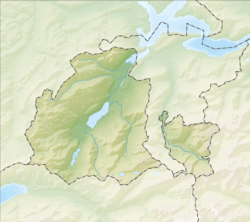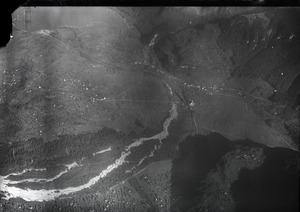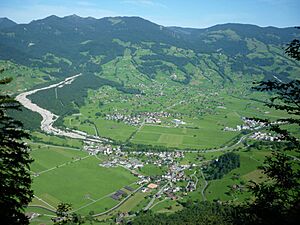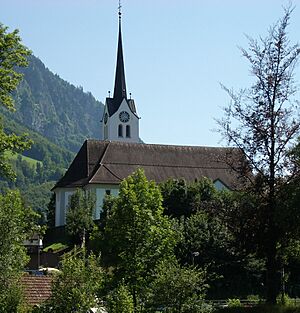Giswil facts for kids
Quick facts for kids
Giswil
|
||
|---|---|---|
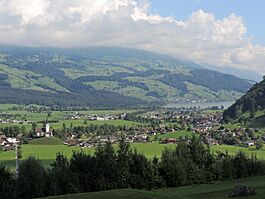
Giswil and Sarnersee as seen from Brünigstrasse in August 2016
|
||
|
||
| Country | Switzerland | |
| Canton | Obwalden | |
| District | n.a. | |
| Area | ||
| • Total | 85.91 km2 (33.17 sq mi) | |
| Elevation | 485 m (1,591 ft) | |
| Population
(Dec 2020 )
|
||
| • Total | 3,676 | |
| • Density | 42.789/km2 (110.823/sq mi) | |
| Postal code |
6074
|
|
| Surrounded by | Flühli (LU), Hofstetten bei Brienz (BE), Lungern, Sachseln, Sarnen, Schwanden bei Brienz (BE) | |
Giswil is a lovely municipality (which is like a town or district) located in the canton of Obwalden, Switzerland. It's a great place to learn about Swiss history and nature.
Contents
A Look Back in Time
Giswil was first mentioned in old writings way back in the 11th century. Back then, it was known as Kisevilare. Imagine how much has changed since then!
Exploring Giswil's Geography
Giswil is found at the southern end of Lake Sarnen. The municipality is made up of several village areas like Grossteil, Kleinteil, Rudenz, and Diechtersmatt. You'll also find many scattered farmhouses and small groups of homes called hamlets.
To the southwest, the land rises into tall mountains. These include the Giswilerstock, Brienzer Rothorn, Arnihaaggen, and Höch Gumme. A mountain pass called the Glaubenbielen Pass connects Giswil to Sörenberg in the Entlebuch region of Lucerne canton.
Giswil covers an area of about 85.9 square kilometers (about 33 square miles). A large part of this land, about 35.9%, is used for farming. Forests cover more than half of the area, at 53.3%. Only a small portion, 2.2%, has buildings or roads. The rest (8.7%) is made up of non-productive land like rivers, glaciers, or mountains.
People and Population
Giswil has a population of about 3,797 people (as of 2022). About 8.9% of the people living here are from other countries. For a while in the late 1800s, the population stayed around 1,600 people because many left due to poverty.
However, in the 20th century, the population grew steadily. Over the last 40 years, it has increased by 38%. This happened because the economy improved, and it became easier to travel to Luzern. This encouraged more people to move to Giswil.
Most people in Giswil (about 95.5%) speak German. Serbo-Croatian is the second most common language (1.0%), followed by Portuguese (0.8%). In 2000, the population was almost evenly split between males (50.9%) and females (49.1%). There were about 1,250 households in Giswil in 2000.
Education and Work
In Giswil, about 68.2% of adults aged 25 to 64 have finished high school or gone on to higher education, like university.
The unemployment rate in Giswil is quite low, at 1.24%. This means most people who want to work can find jobs.
- Farming: About 329 people work in farming, which is called the primary economic sector. There are about 125 businesses in this area.
- Manufacturing and Industry: About 335 people work in the secondary sector, which includes making things in factories. There are 53 businesses in this sector.
- Services: The largest group, 467 people, work in the tertiary sector. This includes jobs like retail, healthcare, and tourism. There are 84 businesses in this sector.
Population Over Time
Here's how Giswil's population has changed through history:
| year | population |
|---|---|
| 1744 | 1,040 |
| 1850 | 1,610 |
| 1900 | 1,711 |
| 1950 | 2,642 |
| 1990 | 3,085 |
| 2000 | 3,435 |
Getting Around Giswil
Giswil has good transport links. The Giswil railway station is on the Brünig railway line. This is a special narrow-gauge railway that connects Interlaken to Lucerne.
An InterRegio train stops at Giswil station every hour. It's also the last stop for the S5 service of the Lucerne S-Bahn, which runs every half-hour from Lucerne.
The A8 motorway (a major highway) passes just south of the town. It goes through the Giswil Tunnel.
What to See in Giswil
If you visit Giswil, there are some interesting sights to explore:
- Castle Ruins: You can see the ruins of two old castles: Rosenberg and Rudenz. These are fun places to imagine what life was like long ago.
- Traditional Farmhouses: In the scattered settlement called Grossteil, you can find many traditional farmhouses. They show how people used to live and build homes in this region.
Giswil's Weather
Giswil typically has about 144 days of rain each year. On average, it gets about 1311 millimeters (about 51.6 inches) of rain.
The wettest month is August, with an average of 168 millimeters (6.6 inches) of rain over about 14.4 days. June also has a lot of rainy days (14.4 days), but with slightly less rain (146 millimeters or 5.7 inches). The driest month is January, which gets about 79 millimeters (3.1 inches) of rain over 14.4 days.
See also
 In Spanish: Giswil para niños
In Spanish: Giswil para niños
 | Emma Amos |
 | Edward Mitchell Bannister |
 | Larry D. Alexander |
 | Ernie Barnes |




